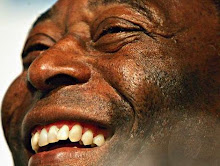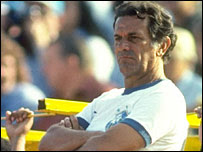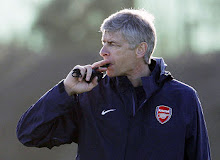A fascinating convergence of two stories from the UK the other day,
brings into focus one of the interesting issues in the world of
football: how the English and Scottish play, ie: their "style".
The stories in question were prompted by comments from two impassioned
Brazilians: the little wizard Juninho and the legendary defender Carlos
Alberto.
It's interesting: two stories come together around one idea and two
Brazilians independent of each other, in different parts of the world, are
the driving forces.
The initial spark came from the mouth of Juninho (in Glasgow), early in
the day. The second came from Carlos Alberto (in Azerbaijan) at the end
of the day.
But before we look at the Brazilians' comments, we should first ask:
"Why should we care about how the English and Scottish play?"
Why does it matter? Afterall, we know in our hearts who plays the best,
most beautiful, most winning football in the world. We don't need to
name names, point fingers.
Still, we do it all the same.
And yet we remain preoccupied with the English and we talk about them.
Why, why, why?
Why do we care?
When they haven't won. When they haven't been beautiful?
Well, first of all, the English supposedly "invented" the game and
delievered it to the world throughout the last two centuries.
And despite England's lack of success in international football since
their lone World Cup win in 1966, and in European club football, they
are still perceived as ambassadors of the game.
As ambassadors they have brought with them their language. And language
plays a part in why England matters to the world game, as English has
long been the language of business and now of the Internet. More and
more people are getting most of their footie news through the Internet.
Also England is home to the Premiership, perhaps the most lucrative
league in the world just now. These days, England is drawing the best
players and coaches.
England matters big time in global soccer. And as a consequence people,
including the English themselves, have for quite a while now had the
expectation that if England matters shouldn't English football also as a
consequence be beautiful, win championships and make people cheer?
Well, yesterday, two men proved themselves to be part of this seemingly
age-old dialogue regarding the quality of English football. As mentioned,
both were Brazilians. One of them cheered, while the other cried. And
actually both had a bit of anger in them.
Now that I think about it, it was anger that was the spark that led us
to this point and to the other emotions that we are examining here.
But let us begin with the crying.
Let us begin with Juninho then.
Based on his outburst yesterday, as reported by Yahoo! Sports, Juninho
clearly doesn't care for Scottish football any more.
He went to Celtic initially with high hopes, donning the green hoops
with pride. He says that he thought that by virtue of his experience
playing successfully in England with Middlesborough FC, playing in Scotland
would be the same:
"I adapted to English football and I thought the style would be the
same in Scotland. I tried to adapt but there is a different way of
thinking here."
I am surprised that during his time in England and in football in
general that Juninho was never exposed to Scottish footballing philosophy.
He must have known what he was getting himself into. In fact, it
wouldn't surprise me if he thought like many players before him: that he could
have an easier go of it in Glasgow, make lots of money, get big-league
attention from footie-mad fans and play in the Champions League.
Fine for strikers who come from a smaller pond (Larssen, Sweden) or get
run out of town (Bellamy, Blackburn). Time and again the ball will be
hammered upfield to them. Odds are that they will score more goals than
ever in their careers.
But a wee, ball-playing midfielder from Brazil? Come on.
We all know what the reality of Scottish midfield play: no balls in, but
crunching tackles galore.
It is a stark no-man's land, full of fear and flight. In Scotland, the
midfield is a place to run through inorder to head a ball.
Says Juninho: "The coach asked me to act outside my natural
instincts...Here it is not in the mentality to pass the ball in midfield. It goes
directly to the attack and it makes it difficult for midfield players."
Surprise, surprise.
Had he never watched an SPL match?
That's the way they've always played; and with the failure of the Berti
Vogts experiment, that's the way they always will play.
I feel for Juninho though. He must be in a lot of pain to be leaving a
situation that could have extended his career in Europe--if he had been
an opportunistic striker.
He seems so very sad: "I want to go back to Brazil and play football. I
wanted to play for another one or two years in Europe but people have
to search for happiness."
And that happiness no doubt involves seeing the ball at his feet
instead of see it sailing through the air like a scud missile.
Indeed, that is one of the key criteria for a Brazilian's happiness: a
ball at the feet. But it is also a measure of good football, beautiful
football, even winning football.
Atleast in the mind of Carlos Alberto, whose Azerbaijan National Team
lost two-nil to England yesterday.
Yes, the ball at the feet.
After attacking Michael Owen in one of the weirdest tirades in recent
footballing history--for disrespecting his team in the build
up to this week's World Cup qualifier--Alberto then had some very complimentary
words for Owen's team (a team, you'll note, coached by a Swede).
He pronounced England's midfield as the best in the world and predicted
that the English would make it to the World Cup final in Germany in 2006.
Big compliments.
As important for me was what he said about their style.
Remember this is a Brazilian speaking: a man from the birth place of the
Beautiful Game.
"The team has improved since the last World Cup. Tonight they were
unbelievable. Their touch of the ball -- this is the kind of football
I like to see."
Seeing.
What did he see?
Beauty?
From the English?
So it would seem.
And this matters greatly.
For we shall have proper ambassadors then. The English will then bring with them
not merely history and language and financial might but beautiful
football too.
And perhaps they will eventually carry the weight of Brazilians who can make
pronouncements about "how" the game is played because they not only play it
beautifully, with that "touch", but because they win too.
And perhaps someday two English players will converge in the news and provide
an insight into the Beautiful Game, and people will listen with fascination.
Friday, April 01, 2005
Scottish Style, English Touch, Brazilian Judgement
Subscribe to:
Post Comments (Atom)
















No comments:
Post a Comment